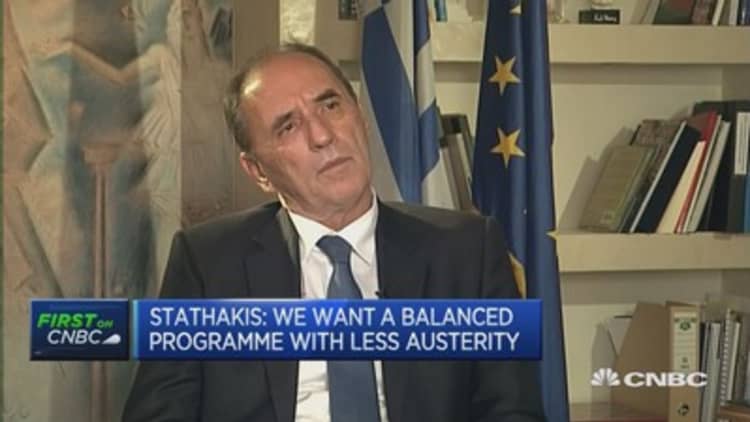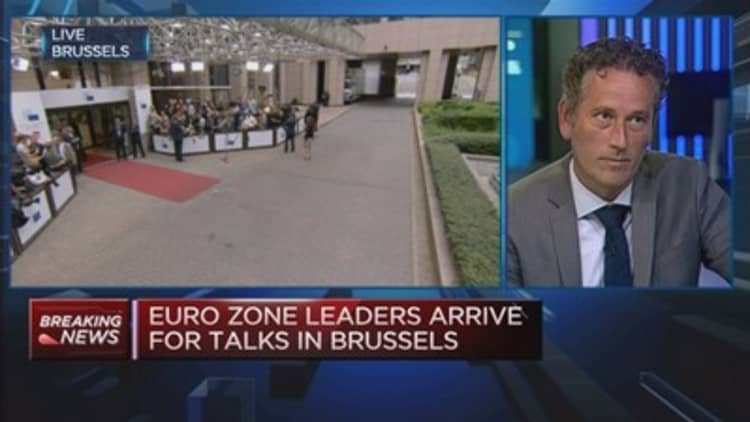


Greece Wednesday asked its battle-weary international creditors for more financial aid as it prepares to present a new set of reform proposals that could determine whether it either goes bankrupt or returns to a degree of economic stability.
The move comes after euro zone leaders gave Greece a final deadline – Friday morning -- to come up with viable reform proposals or face an exit from the euro zone. But whether lenders can agree to the plans after five months of inconclusive negotiations over reforms is uncertain.
Greek Prime Minister Alexis Tsipras did not appear to be in a placatory mood when addressing the European Parliament on Wednesday, however, lambasting Europe's advocacy of austerity and the efficacy of Greece's bailout programs since 2010.
He did, however, promise that detailed, "concrete" would be presented Thursday.
Greek Economy Minister Giorgos Stathakis told CNBC that on Wednesday the Greek government would also request financial aid for Greece to tide the country over the next 18 to 24 months. The European Stability Mechanism (ESM) said Wednesday morning that it had received a formal loan request from Greece.
The Greek crisis came to a head last Sunday when 61 percent of Greeks voted in a referendum against the country's austerity-heavy bailout program proposed by its creditors.
The vote has brought Greece to the precipice in terms of its membership of the euro zone, however, with a "Grexit" – a Greek exit from the euro zone – now a distinct possibility if an agreement over reforms, and more aid, is not found.
"The new government and the referendum actually indicate a very simple proposition. We have to find a more balanced approach than the one implemented in the past. That is our idea. We have been working on it. We came very close to such a deal last week and we think that with some political prowess, both sides can find the solution," Stathakis said.
'Close call' on Grexit
Euro zone leaders had given Greece until Friday to produce a detailed reform plan ahead of a summit of all 28 members of the European Union (EU) on Sunday, at which the leaders will decide whether to accept the plans and negotiate more financial aid for Greece.
Read MoreEU leaders: Greece's final deadline is this week
Failure to reach a deal would make a "Grexit" – a Greek exit from the euro zone - more likely. The President of the European Commission, Jean-Claude Juncker, said on Tuesday that the Commission was "prepared for everything. We have a Grexit scenario prepared in detail," although he added that he was strongly against such a conclusion to the Greek crisis.
After months of deadlock over reforms, market watchers now believe that the weekend is the final, final deadline.
"The future of Greece's position in the Eurozone is likely to be decided by the end of the week," George Saravelos, head of European FX and cross-market strategy at Deutsche Bank, said in a note Wednesday.
"The Europeans last night set the framework around which Greece's Eurozone exit can be averted: Greece effectively has to negotiate the outline of a new 3rd European Stability Mechanism (ESM) program (a third bailout from Europe) by the end of the week. Whether the Greek side is prepared to accept this remains an open question…It is a close call," he added.
Capital controls
With Greece without any financial lifeline, bar emergency liquidity for Greek banks provided by the European Central Bank (ECB), the country has no other option to but to go to its European counterparts for help. It has already defaulted to its other major lender, the international Monetary Fund (IMF).
Since the referendum was called, capital controls have been in place on Greek banks in order to prevent mass deposit withdrawals.
Read MoreGreek capital controls strangle economy
On Tuesday, the ECB said it would do what is necessary to keep Greek banks, which have been receiving emergency liquidity assistance (ELA) from the ECB, afloat until Sunday. Economy Minister Stathakis told CNBC that the current liquidity assistance was "ok for this week but it won't last more than that."
Capital controls have affected every sector of Greek society, with pensioners having to queue for hours to collect largely reduced pension payments and businesses are reporting that supplies are running low.
Vassilis Korkidis, president of the National Confederation of Hellenic Commerce, told CNBC that the Greek market was in a state of "asphyxiation" and that food shortages would be seen in two weeks.
"We're isolated from the rest of the world, we cannot effect payments to our suppliers in Europe or third countries therefore there is no way to deal or work and the economy is standing still, we cannot move."
He said that Greek businesses wanted the government to make Greece's "safety" a priority when approaching lenders this week.
"We have signed a joint statement giving priority to the safety of our country, we don't want bankruptcy, we don't want a default on July 20 (when over 3 billion euros is due to the ECB)."
- By CNBC's Holly Ellyatt, follow her on Twitter @HollyEllyatt. Follow us on Twitter: @CNBCWorld


